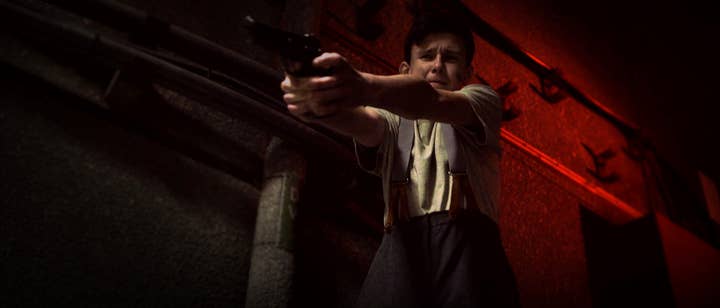"Our whole world fell apart": The fall of Splendy Games
Simon Sparks offers a cautionary tale of how an ambitious indie collapsed, and the toll it took on his mental health
It's easy to see why UK developer Splendy Games believed it was onto something special.
The Bunker, its debut title, garnered attention from beyond the games industry for its ambition: a live-action interactive film where players would be able to change the course of the story. It wasn't the first to explore the concept, nor will it be the last, but something about The Bunker spoke to the media in a way that generated more hype than Splendy could ever have hoped for.
The game was covered in countless magazines, featured on BBC tech show Click, and was cut into a short film for the Cannes Film Festival. It even got optioned as a full feature film.

However, producer Simon Sparks tells us this led to two major problems: "We overestimated sales and we believed in the hype."
We spoke to Sparks earlier this year about the buzz around Black Mirror: Bandersnatch, Netflix's own take on the interactive film concept. At the time, he told us The Bunker only managed 100,000 sales in its first two years, and we've since learned the full impact this had on Splendy.
Shortly after launch, the investor behind The Bunker lost money on other projects and took a step back from its support of Splendy. Meanwhile, the three separate publishing deals for the game were not ideal -- "[They] would look very different now if I had the chance to negotiate terms again", says Sparks.
The cracks started to show, and the Splendy team soon realised their business "wasn't an investable vehicle". In May 2017, they considered starting a new studio with a new brand that would absorb Splendy and allow new investors to come on board. They even had investors lined up, but maintaining momentum became a struggle.
"Unfortunately too soon we got trapped by the investment not coming in early enough and us not having enough money to execute -- we lost the ability to get stuff done," says Sparks. "We had no office or other major fixed costs, so for too long we operated under 'wait and see' and 'when it hits we can...'. The Bunker royalties were keeping us going, but they soon dried up."
Sparks remained determined, with he and his colleagues trying every angel investor they could reach, trying to raise capital or secure other publishing deals -- even looking into movie financing. But eventually Splendy admitted defeat. The company ceased trading and is currently in voluntary insolvency.
"It's really painful, but at some point you have to wake up and smell the coffee"
"It's really painful, but at some point you have to wake up and smell the coffee," says Sparks.
Worse still, Splendy Games was very nearly thrown a lifeline last year by none other than Telltale Games.
Sparks and his team were introduced to CEO Pete Hawley around Christmas 2017 after yet another set of angels had pulled their interest in funding Splendy Games.
"Pete was aware of The Bunker and it turned out a lot of the guys at Telltale loved it," Sparks explains. "We started talking early February, and discovered that we both had a similar vision for bringing 'games or interactive stuff' to Netflix. He offered to fly us out to GDC and it all moved fairly quickly. We pitched him a few ideas over breakfast. The focus was on one big idea: that movies, games and TV can all be in the same universe. The business model was something we danced around, and kind of agreed not to go into detail too early with the movie bit, but games publishing was a standard deal that was fair.
"In my mind I wanted TT to invest directly in us, but I knew we had to prove ourselves first. So I pushed for prototype funding, as it was the fastest route to cash. We'd narrowed down to one idea, which had reasonable budget of $1 million to $3 million. Once they truly saw what we were about and we had the resources at our disposal, being a strategic partner would make sense for both of us."
Splendy drew on learnings from its experiences with The Bunker, with Sparks adding that things were "very considered" this time around. They scaled back on the 'adventure game' elements and focused on storytelling and the psychology of choices.

"Even the early prototypes were shaping up nicely and the processes we put in place to drive out bad and unwanted ideas were working," says Sparks. "We felt like this was the last chance and if we had to pick one company in the whole world to join forces with at that time, it was Telltale Games."
In May 2018, Telltale emailed Splendy, saying it had no money to continue supporting the project.
"We felt like this was the last chance and if we had to pick one company in the whole world to join forces with, it was Telltale Games"
"Our whole world fell apart," says Sparks. "I just couldn't understand, how is this possible? What is going on? I knew [Pete] was intending on raising money, so it was more about trying to tread water until then. Soon after that we got a call: they had tried to save the deal by agreeing a publishing deal with marketing only and no investment, but never received any commitment to the amount of marketing we wanted. It became a worthless contract as they had no skin in the game -- and we now know the reason.
"I want to make it clear that I always liked Pete and his team, we all got on well. Pete was proving difficult to get hold of, but like I said, we know why now."
Sparks began looking into other options, and was soon introduced to Skybound Games CEO Ian Howe, who also loved Splendy's ideas and offered even better terms. The UK studio's vision for games, movies and TV sharing the same fictional universe aligned with Skybound's own strategy.
But with the collapse of Telltale, Skybound had to plough all its resources into saving The Walking Dead's final season -- a decision Sparks finds completely understandable. Nevertheless, it means his studio had just lost a second publishing deal.
"During this time, the team left and had to get other jobs, as Skybound became the last roll of the dice for us," Sparks explains. "We had a great investment story but in the UK the appetite for risk is not the same as in the US. We just couldn't raise the money to keep going and it was an investor that had stuck by me through all of this who said, 'When do you call it? Do you really want to keep putting your family through this?'
"It's a bitter pill to swallow, to admit defeat when you have a great idea and smart people are backing you. No one told us we couldn't do it -- they just pulled out at the last minute or had a less risky offer."
The fall of Splendy was mirrored by another dramatic decline: Sparks' mental health. The pressure of rescuing his company and pursuing their ambitions was taking its toll. In his own words, he "hit rock bottom" around February 2018.
"I felt guilty every time I wasn't working. The idea that I could take my own life was very real, I didn't want to do it, but the thought of it was always with me"
"My mind was so detached from reality that I was convinced my legs were going to fold the other way," he recalls. "I couldn't look at my children and just couldn't process anything. I felt guilty every time I wasn't working. The idea that I could take my own life was very real, I didn't want to do it, but the thought of it was always with me, every time I stood at the train station, every time I did the washing up. I just kept picturing hurting myself or others. I didn't want to be in my head. In my mind I was consistently presented with an image or vision I didn't want nor did I believe was true or how I felt. But it was there.
"My son didn't eat his dinner one night and I went upstairs and hid under my bed. I wanted to scream and shout and do something but I couldn't do anything. I just lay there, emotionless and without any purpose. I called the Samaritans and just cried for about four minutes before even saying a word. I spoke to them as I was so confused about life, I was so confused about my own mind. The next day I saw my doctor and for the next week, my wife would find me hiding around the house as I wasn't sure how my legs worked or just wanted to hide."
A combination of medication and Cognitive Behavioural Therapy -- "which I'm a big fan of" -- helped bring Sparks out of this darkness, as did support from friends and industry peers. He chose to be open about what he was going through, and was surprised to learn how many people had been through the same struggles, or worse.
"The UK games industry also has a Slack workspace where there is a mental health channel and it's been an incredible source of help, perspective and somewhere I've been able to help others," he says. "The investors who stuck by me were incredible too."
By the time Telltale's collapse pulled the rug from under Splendy, Sparks was through the worst of it but he's keen to ensure that no one else suffers in the same way.
"The industry is already doing a great job [of supporting each other], but as always, more can be done," he says. "A lot of people I speak to in person or on the channel don't feel like they have someone in the workplace who understands. So more can be done for the peeps who sometimes just can't get out of bed.
He continues, "The games industry, from what I've seen, has always been one that's every inclusive. But I'm a white middle class male, and so society is unconsciously biased to me. I think we're on the right track to removing any unconscious stigmas and for me your mental wellbeing should be treated like your physical wellbeing. Start with big ideas and do small everyday things to help. CBT should be something everyone understands, it's a great place to start."
With Splendy all but gone, Sparks is now head of talent at cloud gaming start-up Polystream, and keen to enjoy this new chapter of his life. He reiterates that he's open to talking to anyone who has endured the same things he has, and is happy to share his tale in the hopes that other indies -- no matter how dedicated they may be to their ambitions -- don't endanger their mental health for the sake of work.
